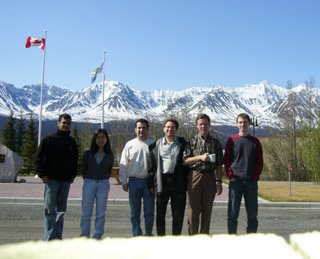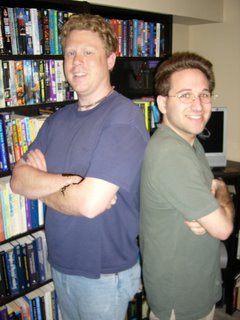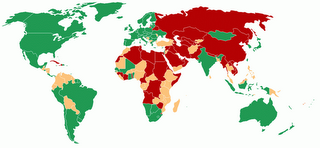As delighted as I’ve been with the popular response to this blog, it’s come to my attention that there are still a few readers who haven’t yet been angered or offended by anything I’ve written. That’s why today’s entry will be about women, science, and Larry Summers.
Granted, it feels strange to be blogging about why there aren’t more women in computer science and the other nerdly disciplines, having just come from a conference where Irit Dinur took the Best Paper Award for her combinatorial proof of the PCP Theorem. But the question remains: why aren’t there more Irits?
A hilarious analysis by Philip Greenspun seems like as good a starting point as any for discussing this question. Here are my favorite passages:
A lot more men than women choose to do seemingly irrational things such as become petty criminals, fly homebuilt helicopters, play video games, and keep tropical fish as pets (98 percent of the attendees at the American Cichlid Association convention that I last attended were male). Should we be surprised that it is mostly men who spend 10 years banging their heads against an equation-filled blackboard in hopes of landing a $35,000/year post-doc job?
Having been both a student and teacher at MIT, my personal explanation for men going into science is the following:
1. young men strive to achieve high status among their peer group
2. men tend to lack perspective and are unable to step back and ask the question “is this peer group worth impressing?”
Consider Albert Q. Mathnerd, a math undergrad at MIT (“Course 18” we call it). He works hard and beats his chest to demonstrate that he is the best math nerd at MIT. This is important to Albert because most of his friends are math majors and the rest of his friends are in wimpier departments, impressed that Albert has even taken on such demanding classes. Albert never reflects on the fact that the guy who was the best math undergrad at MIT 20 years ago is now an entry-level public school teacher in Nebraska, having failed to get tenure at a 2nd tier university. When Albert goes to graduate school to get his PhD, his choice will have the same logical foundation as John Hinckley’s attempt to impress Jodie Foster by shooting Ronald Reagan…
What about women? Don’t they want to impress their peers? Yes, but they are more discriminating about choosing those peers. I’ve taught a fair number of women students in electrical engineering and computer science classes over the years. I can give you a list of the ones who had the best heads on their shoulders and were the most thoughtful about planning out the rest of their lives. Their names are on files in my “medical school recommendations” directory…
With Occam’s Razor, we should not need to bring in the FBI to solve the mystery of why there are more men than women who have chosen to stick with the choice that they made at age 18 to be a professor of science or mathematics.
If you don’t recognize any truth in the above, then (almost by definition) you are not a nerd. Yet Greenspun’s argument immediately raises four questions:
- Is academic science really such a crappy career choice?
- If not, then what else is keeping more women from going into it?
- Regardless of underlying causes, should we be trying to entice more women into science?
- If so, how?
Let me address these questions in turn.
1. Is science really as depressing as Greenspun makes it out to be?
I can only speak for myself. Unlike most people, I don’t “work” at all, in the sense of doing anything with the conscious goal of making money. All I do is think about what interests me, and discuss the results of that thinking with other people. As long as governments (and philanthropists like Mike Lazaridis) are willing to pay me for my non-work, I’m happy to take their money. If they ever stop paying me, I guess I’ll have to find some other source of income.
Of course my perspective might change once I start a tenure-track, which is part of the reason why I haven’t been in any hurry to do so. But for now, I can’t complain about my life as a postdoc. Or rather, I can complain, but then I remember the alternatives. Can I even imagine what it would be like to grapple not with the eternal verities of QMA and PSPACE, but with the fickle whims of the stock market? My only reward being a gigantic pile of cash, most of which wouldn’t even fit in my wallet when I went out for Indian buffet?
2. The trouble with ‘because’
So Greenspun’s “Albert Q. Mathnerd” theory strikes me as at best a partial answer to why more women don’t go into the nerdly sciences. But there’s a stronger argument: if Greenspun were right, then we would expect even fewer women in the humanities and social sciences (which are even more cash-strapped than the sciences), and more women trading derivatives and starting software companies.
And that brings us, of course, to the crater-pocked battlefield where hardened university presidents fear to tread. Are there Darwinian reasons to expect males to be more “spatial” and less “verbal” on average, or to have a higher variance in ability (with both more Alan Turings and more George W. Bushes), etc., etc.? If you want to read an interesting discussion of these questions — one that involves, you know, actual facts and evidence — I heartily recommend this debate (both sides of it) between Steven Pinker and Elizabeth Spelke.
But what do I think about the “root cause” of the gender imbalance in science? I’ll tell you exactly what I think: I think the question is ill-posed. When we say that A causes B, we normally mean something like “if A didn’t happen, then B wouldn’t happen either.” Thus: “if John had had the same upbringing but the biological makeup of a woman, he would have become a lawyer instead of a string theorist.” The trouble is, what does that even mean? With a few arguable and presumably unrepresentative exceptions (like hermaphrodites), no one on Earth has the biology of a man but the life experiences of a woman or vice versa.
To put the point differently: suppose (hypothetically) that what repelled women from computer science were all the vending-machine-fueled all-nighters, empty pizza boxes stacked to the ceiling, napping coders drooling on the office futon, etc.; and indeed that men would be repelled by such things as well, were it not for a particular gene on the Y chromosome called PGSTY-8. In that case, would the “cause” of the gender imbalance be genetic or cultural? This is a fascinating question, right up there with whether rocks fall because of gravity or being dropped, and whether 3+5=5+3 because addition is commutative or because they both equal 8.
3. The nerd case for feminism
Greenspun’s central contention is that we’re not doing an ambitious high-school girl any favors by steering her into the impoverished dungeon of academic science. In his words:
If smart American women choose to go to medical, business, and law school instead of doing science, and have fabulous careers, I certainly am not going to discourage them. Imagine if one of those kind souls that Summers was speaking to had taken Condoleezza Rice aside and told her not to waste time with political science because physics was so much more challenging.
Such a soul would deserve our undying gratitude.
But seriously — I draw a different moral than Greenspun does. I think it’s imperative to increase the number of women in science, not for women’s sake, but for science’s sake! Now would be a good place to insert your favorite joke about the computer labs full of horny, Perl-coding “feminists,” eager to cast off the yoke of sexism and open wide the gates of science to every young woman — whether blonde or brunette, single or possibly single, hot or extremely hot.
But there’s no need to be cynical. I’m not ashamed to assert that
- most people want to socialize with the opposite sex, and are unhappy (and hence unproductive) if they can’t;
- the conscious reasons for wanting to socialize with the opposite sex often have nothing to do with “fluid exchange” (to use the John Nash character’s phrase from A Beautiful Mind),
- let he (or she) who is without subconscious Darwinian motivations cast the first stone,
- human beings didn’t evolve to live their lives in an 85%-male environment,
- by the Pigeonhole Principle, not every straight male will be as lucky as I was to find a girlfriend in the remaining 15%, and
- computer science departments could attract and retain better people of both sexes if they felt less like monasteries or pirate ships.
Naturally, kidnapping women in the dead of night and forcing them to take Randomized Algorithms is off the table. But the question remains: how can we make the nerdly sciences more attractive to women?
4. How to seduce women (into scientific careers)
I have two thoughts in this direction.
The first thought is actually a question: assuming our social support systems made it easier to do so, would many women prefer to have kids first, and then go to grad school? That’s not a rhetorical question; it’s a genuine request for enlightenment. I ask it for three reasons:
- One of female academics’ most famous complaints is that, by the time they’ve battled their way to tenure, they’re already verging on infertility.
- If we consider the most famous female scientists — Marie Curie, Rosalind Franklin, Emmy Noether, Lise Meitner — most were in their 30’s or older when they did their best work. This contrasts with the pattern for male scientists.
- From an evolutionary perspective, the age at which women in the developed world start having kids is unbelievably late. That doesn’t mean we should go back to auctioning off 12-year-old girls as brides in exchange for goats and oxen. But it does suggest, to me, that the currently “normal” ways of balancing career and family might not be Pareto-optimal.
So that was my first thought. The second thought is that, when people talk about cultural changes that would entice more women into science, they always mean changes to nerd culture. You know the sort of thing I’m talking about:
Emphasize teamwork and community over intellectual combat.
Eliminate all-nighters.
Discourage questions in seminars that might hurt someone’s feelings.
Festoon the STOC proceedings with hearts, rainbows, and ponies.
The problem with such proposals is not just that they’re patronizing (and indeed deeply sexist in their own way), and not just that successful female scientists tend to be as competitive as anyone else. The real problem is the implicit assumption that, whenever there’s a disparity between nerd culture and popular culture, the fault must lie with nerd culture.
Sure, there are nerds could stand to shower more often, read more Shakespeare and less Slashdot, etc. But there are also plenty of “normals” who could stand to follow a chain of logic to an inconvenient conclusion, unsheath their sarcasm swords when confronted with idiocy, and judge people more by the originality of their ideas than by whether their clothes match.
In short, if the reason more women don’t study science is that they’re repelled by nerd culture, then de-nerdifying science is only one solution. The other solution is nerdifying the rest of the world! Admittedly, nerdifying the world might seem like a rather drastic way to increase the number of women in university science departments. But as you might have guessed, I want to nerdify the world for independent reasons as well.

 Follow
Follow

